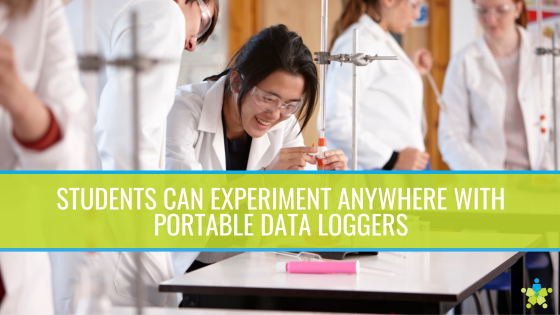[vc_row][vc_column][vc_column_text]Science experiments require precise monitoring of temperature, pressure, and other data. However, keeping track of this data in a school lab is difficult for many students and instructors. With larger classes, labs frequently escalate into chaos as students run into issues with their experiments and teachers need to provide help.
Portable data loggers can minimize that chaos and provide students with additional avenues for STEM learning. With a data logger, users can quickly, easily, and precisely sample many types of scientific data. It’s like having a sensor array that can fit in your pocket.[/vc_column_text][vc_column_text]
The Labdisc: A Portable Data Logger Built for K-12 Classrooms and Labs
Among data logger solutions, the Labdisc stands out for its educational focus and ease of use. Shaped like it sounds - a palm-sized disc - the Labdisc houses several wireless probes that can be used to detect different types of data. Wired probes can also be connected, which is helpful for sampling fluids and medical data. The Labdisc also comes with a few features that make it student and educator friendly. They include:- An extended battery life - The Labdisc is engineered with a long battery life for those times when teachers forget to connect the chargers. Specifically, the Labdisc can provide up to 150 hours of performance on a single charge and can be charged overnight for use the next day.
- A large sample memory - Once students are comfortable with the technology, they’ll start taking samples left and right. That’s okay, because the Labdisc contains a 1 million-deep sample memory. That’s enough memory for an entire school year of data logging.
- Large LCD display and simple controls - The Labdisc comes with a bright, 12-bit resolution LCD display that makes control and data interpretation easy to manage. The display uses large numbers and visual icons for readability, and the Labdisc’s tactile controls are minimalistic. In this case, technology stays out of science’s way.
What Sensor Options are Available with the Labdisc Data Logger?
Labdisc data loggers are available in several models, each with a different sensor array. There’s four altogether, including:- Labdisc Enviro - The Labdisc Enviro is designed to help students analyze the world around them, as the Enviro is built for field experimentation. The Enviro’s sensor array includes ambient temperature, external temperature, IR temperature, barometer, pH, relative humidity, colorimeter, UV, sound level, and turbidity sensors.
- Labdisc Gensci - The Labdisc Gensci supports data sampling for the hard sciences. The onboard sensor array includes air pressure, ambient temperature, external temperature, relative humidity, distance (for motion tracking), electrical current, voltage, sound levels, pH, and GPS tracking. The Labdisc Gensci is ideal for teaching critical scientific laws, such as Newton’s Laws and Boyle’s Law.
- Labdisc Biochem - The Labdisc Biochem combines biological and chemistry functions into a single data logging device. Its sensor array includes air pressure, barometric pressure, ambient temperature, external temperature, conductivity, dissolved oxygen, heat rate, pH, light levels, relative humidity, thermocouple, turbidity, and colorimeter function.
- Labdisc Physio - The Labdisc Physio is designed for easily sampling physics data, turning the abstract world of physics into something that students can understand. To do this, the Physio comes with air pressure, ambient temperature, external temperature, electrical current, distance, accelerometer, light level, and voltage sensors. The Physio is also built with a microphone and is compatible with additional force sensors for more thorough data sampling.



